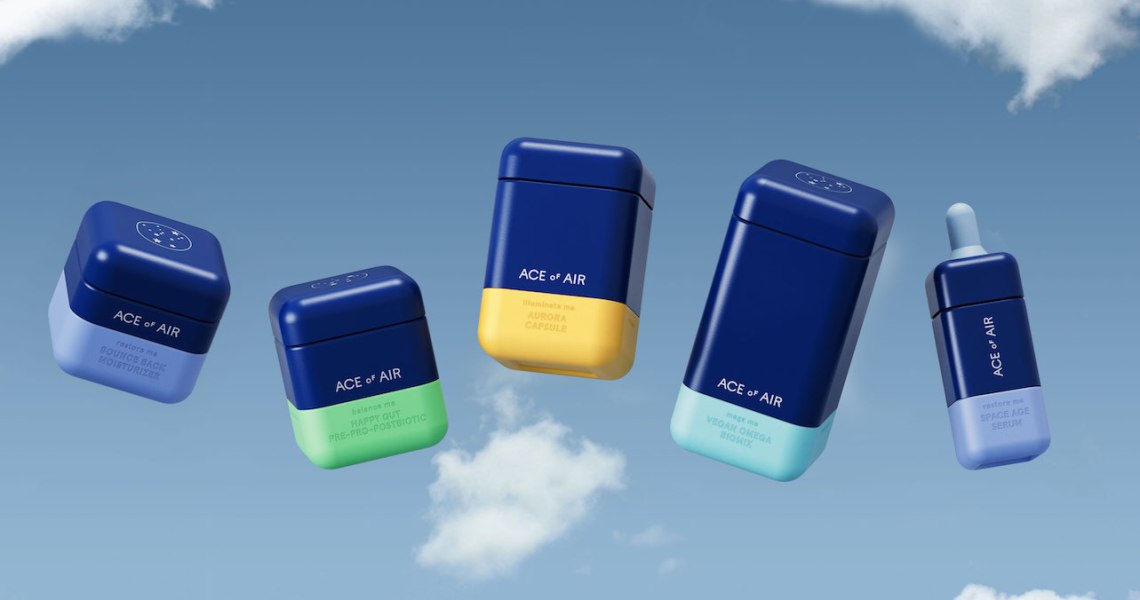For decades, people have been able to borrow a book from the library, rent a home or car, and more recently rent clothes from startups like Rent the Runway. Now, a new beauty brand wants to offer consumers the chance to rent product packaging in the name of conserving the planet.
Ace of Air, which launched Thursday, is a gender-neutral skin-care and supplement brand, which requires customers to “rent” the primary packaging for a non-refundable $2 per product. The direct-to-consumer brand launched with eight products priced $35-$85. Products are shipped in a special box, referred to as a Boomerang Box, that can be used up to 100 times and includes a return label so customers can return the shipping package to Ace of Air through UPS. Petra Němcová, Ace of Air chief inspiration officer and co-founder, jokingly described its packaging as a “James Bond suitcase.”
Ultimately, Ace of Air is attempting to re-engineer a method of sustainable shipping and packaging, and push consumers to rethink what purchasing a “product” actually means.
“In today’s world, you rent Lime scooters, you rent [clothes through] Rent the Runway, and there are rental cars, so we felt like the rental model was the best way to be all-inclusive and accessible,” said Stephanie Stahl, Ace of Air CEO and co-founder. “We aspire to be the Tesla of the beauty and wellness world.”
Unlike TerraCycle’s Loop system, where customers deposit a specified cost and get it back when they return the empty packaging, Ace of Air customers do not recoup the $2 cost for each product since it’s a traditional rental concept. Němcová said the $2 per-product rental fee is a separate line item at checkout, plus there’s a $3 rental fee for the Boomerang Box. Additional shipping costs vary by location.
“The rental fee [line item] is purposely designed to remind customers that this is a shared economy, meaning that we are sharing the packaging,” she said.
Stahl said that while Ace of Air was in development, the team conducted a lifecycle analysis on various DTC skin-care and supplement products to understand the negative environmental impact that the product, its packaging and shipping has. What was found, on average, was that the product accounts for 25% of the environmental impact, shipping is 5%, and packaging is the remaining 70%.
According to the Environment Protection Agency, containers and packaging for categories like cosmetics and food make up a major portion of municipal solid waste, amounting to 82.2 million tons in 2018 or 28% of total waste generation. Furthermore, it was estimated that 14.5 million tons of plastic containers and packaging were generated in 2018, approximately 5% of waste generation.
Although the rental concept is familiar and the sharing economy continues to grow, the difficulty for Ace of Air lies in getting customers to rethink their notion of what purchasing a product means and that they ought to rent it to begin with.
“Even though you own the package, you throw it out, right? It’s not like a house or an apartment [that you rent],” said Stahl.
To do so, Ace of Air is focusing on small pieces of content, such as short posts and videos on Instagram, that focus on the brand’s ethos in a “fun, compelling and feel-good way,” Stahl said. The company will also work with influencers at launch, but declined to specify who, how many, or whether they would be paid or unpaid partnerships. Němcová, a model, television host and well-known philanthropist, has an Instagram following of 155,000 people, while Ace of Air launched with approximately 750 followers.




